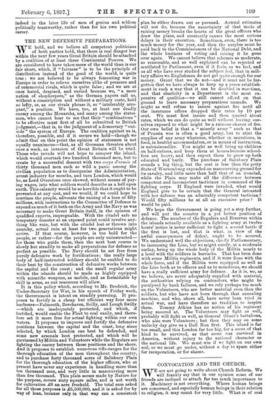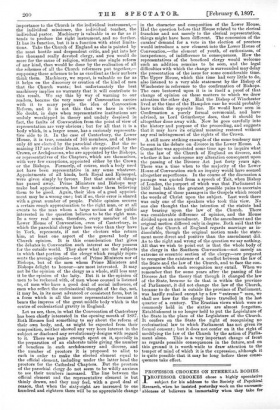CONVOCATION AND THE CHURCH.
ViTE are not going to write about Church Reform. We will frankly say that in our opinion some of our friends are inclined to attach far too much importance to it. Machinery is not everything. Where human beings are concerned, and especially human beings in their relation to religion, it may count for very little. What is of real importance to the Church is the individual instrument,— the individual missioner, the individual teacher, the individual pastor. Machinery is valuable in so far as it tends to produce the right instrument, and no further. It has its function, but it is a function with strict limita- tions. Take the Church of England as she is painted by the most hostile and despondent critic, and put into her five thousand really devoted clergy, and you would do more for the cause of religion, without one single reform of any kind, than would be done by the realisation of all the schemes of all the Church reformers put together,— supposing these schemes to be as excellent as their authors think them. Machinery, we repeat, is valuable so far as it helps on the discovery or creation of the kind of men that the Church wants; but unfortunately the best machinery implies no warranty that it will contribute to this result. We say this by way of warning to our readers, because the very name of Convocation carries with it to many people the idea of Convocation Reform, and it is not this that we have in view. No doubt, in days when representative institutions are unduly worshipped in theory and unduly despised in fact, the faults of Convocation from the point of view of representation are very obvious ; but for all that it is a body which, in a larger sense, has a curiously representa- tive side to it. In the case of Canterbury, the Lower House, it is true, consists of 165 members, and of these only 48 are elected by the parochial clergy. But the re- maining 117 are either Deans, who are appointed by the Crown, or Archdeacons, who are appointed by the Bishops, or representatives of the Chapters, which are themselves, with very few exceptions, appointed either by the Crown or the Bishops. Formerly, of course, such a body need not have been representative in any sense whatever. Appointments of all kinds, both Royal and Episcopal, were given simply by favour. But that state of things has passed away. Prime Ministers and Bishops may make bad appointments, but they make them believing them to be good. Again, their idea of a good appoint- ment may be a wrong one ; but if so, their error is shared with a great number of people. Public opinion secures a certain rough approximation to the right man, or at all events to the man whom a large section of the public interested in the question believes to be the right man. In a very real sense, therefore, every member of the Lower House of Convocation, even of Canterbury, in which the parochial clergy have less voice than they have in York, represents, if not the electors who return him, at least one aspect of the general body of Church opinion. It is this consideration that gives the debates in Convocation such interest as they possess for the outside world. They show what are the subjects in which that portion of the clergy which roughly repre- sents the average opinion—not of Prime Ministers nor of Bishops, but of the men whom Prime Ministers and Bishops delight to honour—are most interested. It may not be the opinion of the clergy as a whole, still less may it be the opinion of the laity. But it is the opinion of men to be reckoned with, of men whose counsel is listened to, of men who have a good deal of social influence, of men who reflect the ecclesiastical thought of the day, not, it may be, in its most advanced or consistent form, but in a form which is all the more representative because it bears the impress of the great middle body which is the centre of ecclesiastical gravity in England.
Let us see, then, in what the Convocation of Canterbury has been chiefly interested in the opening month of 1897. Both Houses had something to say about the reform of their own body, and, as might be expected from their composition, neither showed any very keen interest in the subject or disclosed any revolutionary designs with regard to it. There was pains enough spent on it, specially in the preparation of an elaborate table giving the number of benefices in each archdeaconry and diocese, and the number of proctors it is proposed to allot to each in order to make the elected element equal to the official element, including under the latter head the proctors for the Cathedral Chapters. But the proctors of the parochial clergy do not seem to be wildly anxious to see their numbers increased. The line between the official element and the representative element is but thinly drawn, and they may feel, with a good deal of reason, that when the sixty-eight are increased to one hundred and eighteen there will be no appreciable change in the character and composition of the Lower House. Had the question before that House related to the clerical franchise and not merely to the clerical representation, things might have been different. The concession of the curates' demand for a vote in the election of proctors would introduce a new element into the Lower House of Convocation,—the element of youth, of enthusiasm, of inexperience, of indifference to consequences. How the representatives of the beneficed clergy would welcome such an addition remains to be seen, and the legal difficulties with which the change is surrounded may delay the presentation of the issue for some considerable time. The Upper House, which this time had very little to do, also listened to a very able statement by the Bishop of Winchester in reference to the confirmation of Bishops. The care bestowed upon it is in itself a proof of that change of opinion on these matters to which we drew attention the other day. Had the Bishop of Winchester lived at the time of the Hampden case he would probably have taken the opposite line. He would have seen in Confirmation a purely formal ceremonial, and have advised, as Lord Grimthorpe does, that it should be altogether done away with. Now he goes carefully into the history and purpose of the proceeding, and suggests that it may have its original meaning restored without any real infringement of the rights of the Crown.
A still more striking example of the same tendency may be seen in the debate on divorce in the Lower House. A Committee was appointed some time ago to inquire what is the law of the Church of England on divorce, and whether it has undergone any alteration consequent upon the passing of the Divorce Act just forty years ago. There was a time when to the majority of the Lower House of Convocation such an inquiry would have seemed altogether superfluous. In the course of the discussion a passage was quoted from a speech of Tait, when Bishop of London, the purport of which was that Parliament in 1857 had taken the greatest possible pains to ascertain the meaning of those passages in the Gospels which record the words of Christ upon the subject. Last week there was only one of the speakers who took this view. No one else thought that the intention of the statute had any bearing upon the law of the Church. There was considerable difference of opinion, and the House divided upon an amendment. But the amendment and the original motion differed only in degree. Both said that the law of the Church of England regards marriage as in- dissoluble, though the original motion made the state- ment more direct and positive than the amendment did. As to the right and wrong of the question we say nothing.' All that we wish to point out is that the whole body of the clergy in the Southern Convocation—not merely an extreme or eccentric section of the clergy7--are prepared to recognise the existence of a conflict between the law of the State and the law of the Church, and to face the con- sequences which such recognition may entail. When we remember that for some years after the passing of the Divorce Act the theory that though it changed the law of the State, because to do that is within the province of Parliament, it did not change the law of the Church, because to do that is outside the province of Parliament, was hardly realised except by a few " extreme " men, we shall see how far the clergy have travelled in the last quarter of a century. The Erastian views which were so commonly held in the sixties are almost forgotten. Establishment is no longer held to put the Legislature of the State in the place of the Legislature of the Church. It confers on the State the right of recognising no ecclesiastical law to which Parliament has not given its formal consent ; but it does not confer on it the right of modifying the law of the Church by the action of Parlia- ment alone. This is a very important change of front as regards possible consequences in the future, and on this ground it is worth while to draw attention to the temper of mind of which it is the expression, although it is quite possible that it may be long before these conse- quences take effect.







































 Previous page
Previous page